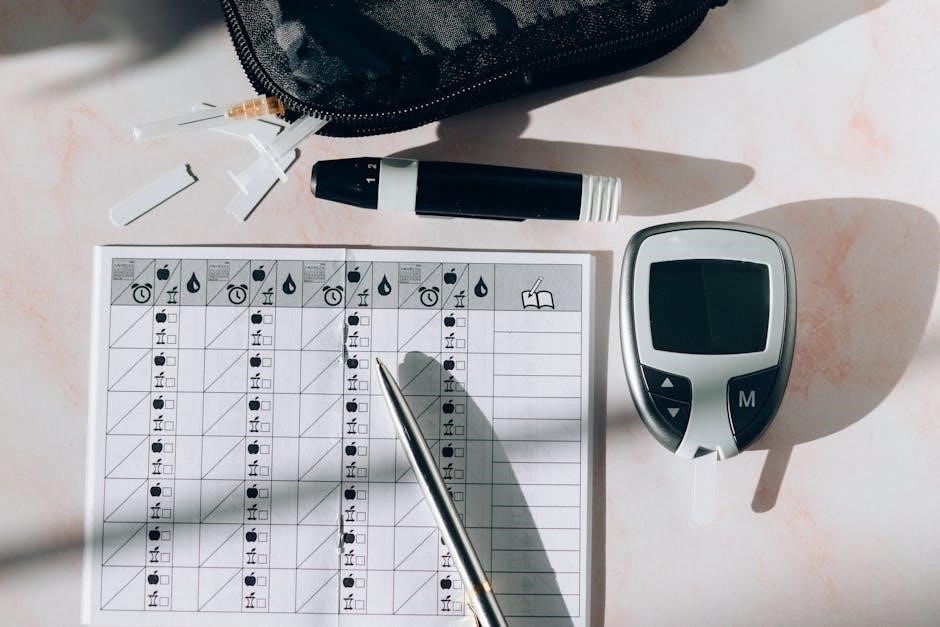1.1 What is the Blood Type Diet?
The Blood Type B Positive Diet, developed by Dr. Peter D’Adamo, is a personalized nutrition plan tailored to individuals with B positive blood type. It focuses on consuming foods that align with the body’s unique digestive and immune system needs, promoting better health and weight management.
The Blood Type Diet is a personalized nutrition plan developed by Dr. Peter D’Adamo, tailored to individuals based on their blood type. It suggests that certain foods are more beneficial or harmful depending on one’s blood type, as these foods interact with the body’s unique digestive and immune system. For B positive individuals, the diet emphasizes foods like dairy, green vegetables, eggs, fish, and specific fruits, while avoiding others that may cause health issues. The goal is to enhance overall health, boost energy, and support weight management by aligning dietary choices with genetic and biological factors. This approach is designed to optimize digestion and reduce inflammation, promoting a balanced lifestyle.
1.2 Importance of Blood Type in Nutrition
The Blood Type B Positive Diet emphasizes the role of blood type in determining nutritional needs, as it affects how the body processes foods. Blood type influences digestion, immune response, and nutrient absorption, with certain foods interacting differently based on blood type antigens. For B positive individuals, foods like dairy, green vegetables, and specific meats are beneficial, while others, such as corn, wheat, and certain legumes, may cause discomfort or health issues. Understanding blood type-specific nutrition helps optimize health, energy levels, and weight management, aligning dietary choices with biological needs. While some critics question the diet’s scientific basis, many report improved well-being by following its guidelines.
Key Foods for B Positive Blood Type
Dairy products, green vegetables, eggs, fish, and fruits like bananas and grapes are highly beneficial for B positive individuals, supporting overall health and digestion.
2.1 Highly Beneficial Foods
For individuals with B positive blood type, highly beneficial foods include dairy products, green vegetables, eggs, and certain meats like chicken and turkey. Fish such as salmon and cod are also recommended. Fruits like bananas, apples, and cherries are advantageous, while grains like rice and oats are tolerated well. Legumes, such as lentils and chickpeas, are considered highly beneficial. These foods support digestion, immune function, and overall health, aligning with Dr. Peter D’Adamo’s recommendations for B positive individuals. Incorporating these foods into your diet can enhance energy levels and reduce the risk of chronic conditions, promoting a balanced and thriving lifestyle.
2.2 Proteins for B Positive Individuals
Proteins play a crucial role in the B positive diet, with certain sources being highly beneficial. Fish like salmon, cod, and trout are excellent choices due to their omega-3 content and ease of digestion. Eggs are also highly recommended, providing essential amino acids and nutrients. Lean meats such as chicken and turkey are advantageous, while beef and lamb should be consumed in moderation. Avoid pork, as it can be harmful. Additionally, some seafood like mussels and crab are beneficial, while shrimp and scallops should be avoided. These protein sources support immune function and overall health, making them a cornerstone of the B positive diet.
2.3 Recommended Fruits for B Positive
Fruits play a vital role in the B positive diet, offering essential vitamins and minerals. Bananas and grapes are highly beneficial, providing natural energy and supporting digestive health. Berries such as strawberries, blueberries, and raspberries are rich in antioxidants and are excellent choices. Pineapple is also recommended for its anti-inflammatory properties. Kiwi and mango are additional options that align well with the B positive blood type. However, fruits like oranges, grapefruits, and tomatoes should be avoided due to their high acidity, which can disrupt the body’s pH balance. Incorporating these fruits into your diet can enhance overall well-being and provide a natural source of nutrition.
Foods to Avoid for B Positive Blood Type
Individuals with B positive blood type should avoid corn, wheat, tomatoes, and processed foods, as these can trigger inflammation or weight gain. Certain meats and shellfish should also be limited to maintain optimal health and digestion.
3.1 Harmful Foods
For individuals with B positive blood type, certain foods can be harmful and should be avoided to maintain optimal health. These include corn, wheat, and tomatoes, which can cause inflammation and hinder digestion. Processed foods high in sugar and unhealthy fats are also detrimental, as they can lead to weight gain and energy imbalances. Additionally, some proteins like chicken and processed meats should be limited, as they may disrupt the body’s natural balance. Dairy products, especially those high in lactose, can also be problematic for some B positive individuals. It’s important to focus on natural, whole foods that align with the B positive dietary recommendations to avoid these harmful effects.
3.2 Foods That Should Be Limited
While not entirely prohibited, certain foods should be consumed in moderation by B positive individuals. These include legumes like lentils and peanuts, which can cause inflammation. Caffeine and alcohol should also be limited, as they may disrupt metabolic balance; Refined carbohydrates, such as white bread and pastries, can lead to energy crashes and weight gain. Dairy products like cheese and ice cream should be eaten sparingly, as they can slow digestion. Additionally, shellfish and excessive sugar intake should be moderated to avoid potential health issues. Balancing these foods appropriately ensures the diet remains effective without causing harm.

Benefits of the B Positive Diet
The B positive diet promotes improved digestion, increased energy, and enhanced immune function. It helps maintain a healthy weight and reduces the risk of chronic diseases.
4.1 Health Benefits
The B positive diet offers numerous health benefits, including improved digestion, reduced inflammation, and enhanced immune function. By focusing on compatible foods, individuals can experience increased energy levels and mental clarity. The diet helps maintain a healthy weight, reducing the risk of chronic diseases like diabetes and heart conditions. It also supports balanced blood sugar levels and improves overall nutrient absorption. Additionally, adhering to the B positive diet can lead to better skin health and reduced allergies. This personalized approach to nutrition aligns with genetic factors, promoting long-term well-being and vitality. Consistency with the diet often results in a noticeable improvement in overall health.
4.2 Weight Management
The B positive diet can aid in effective weight management by focusing on foods that promote metabolism and reduce fat storage. Avoiding harmful foods like corn, wheat, and lentils, which can cause weight gain in B positive individuals, is crucial. Incorporating lean proteins, such as turkey and fish, and beneficial vegetables helps maintain a healthy weight. The diet also emphasizes portion control and mindful eating to prevent overconsumption. By aligning food choices with genetic makeup, individuals can achieve a balanced weight and reduce the risk of obesity-related issues. Consistency with the diet often leads to sustainable weight loss and improved body composition.
How to Implement the B Positive Diet
Start by identifying beneficial foods, creating a meal plan, and gradually replacing harmful foods. Track progress, stay consistent, and adapt as needed for sustainability and flexibility.
5.1 Creating a Balanced Meal Plan
A balanced meal plan for B Positive individuals involves focusing on highly beneficial foods like lean meats, fish, and dairy, while minimizing harmful options. Start by consulting a Blood Type B Positive food list to identify allowed foods. Plan meals around protein sources, such as turkey, chicken, and fish, paired with beneficial vegetables like spinach and sweet potatoes. Incorporate fruits like berries and bananas in moderation; Balance macronutrients by combining proteins, healthy fats, and complex carbs in each meal. Consider meal prepping to ensure consistency and convenience. Hydration is also key, so include water-rich foods and drinks in your plan. Consistency is crucial for achieving optimal health benefits.
5.2 Incorporating Supplements
Supplements can enhance the B Positive diet by addressing nutritional gaps and supporting overall health. Vitamin D is beneficial for bone health, while omega-3 fatty acids support heart health and brain function. Probiotics are recommended to aid digestion, as B Positive individuals may have sensitive digestive systems. Magnesium and calcium supplements can also be beneficial for energy and muscle function. Always consult a healthcare provider before starting any supplement regimen to ensure safety and effectiveness. Tailor your choices to your specific health needs, and remember that supplements should complement, not replace, a balanced diet. Consistency and proper dosing are key to maximizing benefits.

Common Mistakes to Avoid
Overconsumption of harmful foods, ignoring portion sizes, and neglecting hydration are common pitfalls. Avoiding proper meal planning and not reading food labels can derail progress. Stay vigilant and disciplined to maintain balance and achieve optimal results consistently.
6.1 Pitfalls in the B Positive Diet
One common pitfall is overconsumption of foods deemed “beneficial,” leading to imbalance. For instance, while goat dairy is allowed, excessive intake can cause digestive issues. Additionally, some individuals overlook portion sizes, thinking “allowed” foods are calorie-free, which can hinder weight goals. Another mistake is neglecting to pair proteins with complementary foods, disrupting nutrient absorption. Lastly, relying too heavily on supplements instead of whole foods can diminish the diet’s effectiveness. Staying mindful of these pitfalls ensures a balanced and sustainable approach to the B Positive diet.

Scientific Backing and Criticism
The Blood Type B Positive Diet lacks robust scientific support, with critics arguing it oversimplifies nutrition. Limited studies show mixed results, and experts emphasize individual variability over blood type for dietary needs.
7.1 Studies on the Blood Type Diet
Scientific studies on the Blood Type Diet have yielded mixed results. Some research suggests that individuals may experience improved health outcomes, such as weight loss or better blood sugar regulation, by adhering to blood-type-specific diets. However, these findings are often based on small-scale studies with limited sample sizes. Critics argue that the diet lacks robust scientific evidence, as no large-scale, long-term studies have conclusively proven its benefits. Additionally, the diet’s underlying premise—that blood type determines optimal nutrition—remains controversial among experts. While some people report positive effects, the scientific community generally views the Blood Type Diet with skepticism due to insufficient supporting data.
7.2 Expert Opinions
Expert opinions on the Blood Type Diet vary significantly. Some nutritionists and healthcare providers believe it offers a personalized approach to nutrition, potentially improving digestion and reducing inflammation for B Positive individuals. They argue that aligning diet with blood type can enhance metabolic efficiency. However, many experts remain skeptical, citing a lack of conclusive evidence supporting its universal benefits. Critics emphasize that individual nutritional needs are influenced by multiple factors beyond blood type, such as genetics, lifestyle, and overall health. While some recommend it as a starting point for personalized nutrition, others caution against strict adherence without further scientific validation.

Meal Planning Tips
Plan meals with B Positive-friendly foods, balancing proteins, vegetables, and fruits. Focus on beneficial ingredients and avoid harmful ones for optimal health and energy levels.
8.1 Breakfast Ideas
Start your day with B Positive-friendly breakfast options like scrambled eggs with spinach, turkey bacon, or lamb. Oatmeal with berries and a drizzle of honey is also ideal. Incorporate alkaline-rich foods such as bananas or papaya. Smoothies made with beneficial fruits like mangoes and pineapple, blended with green vegetables, can provide a nutrient-packed start. Avoid wheat-based cereals and opt for gluten-free alternatives instead. Pair your breakfast with herbal teas like peppermint or chamomile for digestion. Remember to use olive oil for cooking and avoid processed foods to maintain balance and energy throughout the morning.
8.2 Lunch and Dinner Suggestions
For B Positive individuals, focus on protein-rich meals with lean meats like turkey, lamb, or fish such as salmon. Pair these with beneficial vegetables like spinach, kale, or sweet potatoes. Grains like quinoa or rice are excellent options. Incorporate healthy fats such as olive oil or avocado to enhance meals. Consider grilling or baking to avoid harmful lectins found in processed foods. A balanced lunch could be a turkey and avocado wrap with lettuce, while dinner might feature baked salmon with roasted vegetables. Herbs like garlic and ginger can add flavor without causing harm. These meals support overall health and energy levels, aligning with the B Positive diet principles.
8.3 Snacks and Desserts
For B Positive individuals, snacks and desserts should focus on beneficial foods. Nuts like almonds or walnuts make great snacks, while fresh fruit like apples or berries is ideal. For desserts, opt for natural sweeteners like honey or maple syrup. Try homemade treats using almond flour or coconut sugar. Avoid harmful lectins found in wheat, corn, or soy-based products. Smoothies with beneficial fruits and a touch of honey are a healthy dessert option. Dark chocolate with at least 70% cocoa can be enjoyed in moderation. These choices ensure satisfaction while adhering to the B Positive diet, promoting overall well-being and energy balance.

Grocery Shopping Guide
Focus on lean meats, low-lactose dairy, and beneficial grains. Include fresh vegetables, fruits, and nuts. Avoid harmful lectins in wheat, corn, and soy products for optimal health.
9.1 Essential Items for B Positive
Stock your pantry with lean meats like turkey, chicken, and lamb. Incorporate fish such as salmon and cod for omega-3 benefits. Low-lactose dairy products, including yogurt and goat cheese, are ideal. Whole grains like rice, oats, and quinoa are recommended. Fresh vegetables like spinach, broccoli, and sweet potatoes are beneficial. Fruits such as berries, apples, and bananas are excellent choices. Nuts like almonds and walnuts provide healthy fats. Avoid harmful lectins in wheat, corn, and soy products. Focus on beneficial foods to support immune function and energy levels. Always check labels for hidden additives and opt for organic where possible.
9.2 Tips for Smart Shopping
Plan your shopping with a list to avoid impulse buys. Focus on fresh, seasonal produce and lean proteins. Read labels to ensure products align with B Positive dietary needs. Opt for organic or non-GMO options when possible. Shop the perimeter of the store for whole foods like meats, vegetables, and dairy. Avoid middle aisles often filled with processed items. Buy in bulk for staples like grains and nuts to save money. Store items properly to maintain freshness. When dining out, choose restaurants with B Positive-friendly options. Always carry a reference guide or app for quick checks. Smart shopping ensures adherence to the diet and long-term success;

Staying on Track
Plan meals, track food intake, and set realistic goals. Stay consistent, avoid tempting situations, and celebrate small achievements. Discipline and mindfulness are key to long-term success.
10.1 Travel and Dining Out
When traveling or dining out, it’s essential to stay committed to your B Positive diet. Research restaurants in advance to ensure they offer blood type-friendly options. Opt for fresh, unprocessed foods like grilled meats, fish, and vegetables. Avoid harmful foods such as corn, wheat, and tomatoes, even in small amounts. Pack snacks like nuts or fruit to avoid temptation. If unsure about ingredients, ask your server for modifications or choose simple dishes. Staying hydrated with water or herbal teas can also help maintain discipline. By planning ahead and making mindful choices, you can enjoy dining out while adhering to your dietary needs.
10.2 Mindful Eating
Mindful eating is a powerful practice for B Positive individuals, helping them stay aligned with their dietary needs. It involves paying full attention to the experience of eating, savoring flavors, and listening to your body’s signals. This approach encourages a deeper connection with food, reducing impulsive choices. For B Positive, mindful eating means focusing on beneficial foods like lean meats, green vegetables, and low-fat dairy while avoiding harmful ones like corn and wheat. Staying hydrated and maintaining a balanced intake of nutrients are also key. By being present during meals, you can better manage portion sizes and make healthier decisions, fostering long-term adherence to the B Positive diet.

Exercise and Lifestyle Considerations
For B Positive individuals, moderate exercise like swimming or cycling is recommended. Stress management and sufficient sleep support overall well-being and complement the dietary regimen effectively.
11.1 Physical Activity for B Positive
Individuals with B Positive blood type benefit from moderate physical activity, such as swimming, cycling, or yoga, to maintain balance and energy. These exercises support digestion and circulation, which are crucial for B Positive individuals. Avoiding overexertion is key, as B Positive people may tire easily. Regular, consistent workouts help maintain weight and improve mental clarity. Combining physical activity with the B Positive diet enhances overall health and well-being. It’s important to listen to your body and balance exercise with rest to avoid burnout. Tailoring your routine to your lifestyle ensures long-term sustainability and optimal health outcomes.
11.2 Lifestyle Factors
Lifestyle factors play a significant role in the overall health of B Positive individuals. Managing stress through mindfulness, meditation, or deep-breathing exercises is essential, as B Positive individuals may be more prone to stress-related issues. Ensuring adequate sleep and maintaining a consistent daily routine supports digestion and energy levels. Additionally, staying mentally active through hobbies or creative pursuits can enhance overall well-being. Avoiding excessive exposure to toxins and maintaining a clean living environment is also beneficial. Balancing work and leisure time helps prevent burnout and supports long-term health. By incorporating these lifestyle practices, B Positive individuals can optimize their health and complement their dietary efforts effectively.

Hydration
Proper hydration is essential for B Positive individuals to maintain optimal health. Drinking plenty of water supports digestion, energy levels, and overall bodily functions. Incorporate herbal teas and natural fluids to stay hydrated effectively.
12.1 Importance of Water and Fluids
Hydration plays a vital role in the B Positive diet, as water and fluids are essential for maintaining bodily functions. Water aids in digestion, nutrient absorption, and waste elimination, ensuring overall health. For B Positive individuals, staying hydrated helps regulate blood viscosity and supports energy levels. Herbal teas, like ginger or peppermint, are excellent alternatives to plain water. Additionally, consuming fluids rich in electrolytes, such as coconut water or vegetable juices, can help maintain a healthy balance. Avoid sugary drinks and opt for natural, unsweetened beverages to maximize hydration benefits without compromising dietary goals.

Frequently Asked Questions
Hydration is crucial for B Positive individuals, as water aids digestion, nutrient absorption, and toxin removal. Incorporate herbal teas and electrolyte-rich fluids like coconut water for optimal health benefits.
13.1 Common Queries
Common questions about the B Positive diet include inquiries about the best foods to eat, how to avoid harmful foods, and where to find a comprehensive food list. Many ask if the diet is scientifically proven and how it impacts weight loss. Others seek advice on incorporating supplements and managing hydration. Some wonder about meal prepping and dining out while following the diet. Additionally, questions arise about potential allergies or intolerances to recommended foods and how to handle them. These queries highlight the need for a detailed food list PDF to guide B Positive individuals in making informed dietary choices.
The B Positive diet offers a personalized approach to nutrition, promoting health and vitality by focusing on beneficial foods. Adhering to this plan can lead to improved well-being and energy levels, making it a worthwhile commitment for long-term health.
14.1 Final Thoughts
The B Positive diet is a tailored approach to nutrition that emphasizes harmony between blood type and food choices. By focusing on beneficial foods and avoiding harmful ones, individuals can achieve improved health, digestion, and energy levels. Consistency is key, as the diet requires commitment to see lasting results. While some may find the restrictions challenging, the potential benefits make it a worthwhile effort. Always consult a healthcare professional before making significant dietary changes. With patience and dedication, the B Positive diet can serve as a foundation for a healthier, more balanced lifestyle.
14.2 Encouragement
Embracing the B Positive diet is a positive step toward a healthier life. While it may require adjustments, the long-term benefits are rewarding. Focus on the variety of delicious, nutrient-rich foods allowed, and experiment with new recipes to keep meals exciting. Remember, small changes today can lead to significant improvements in your well-being tomorrow. Stay motivated by tracking progress, celebrating milestones, and reminding yourself of the goal: a vibrant, energetic you. With persistence, the B Positive diet can become a sustainable and enjoyable lifestyle choice, helping you thrive for years to come.
